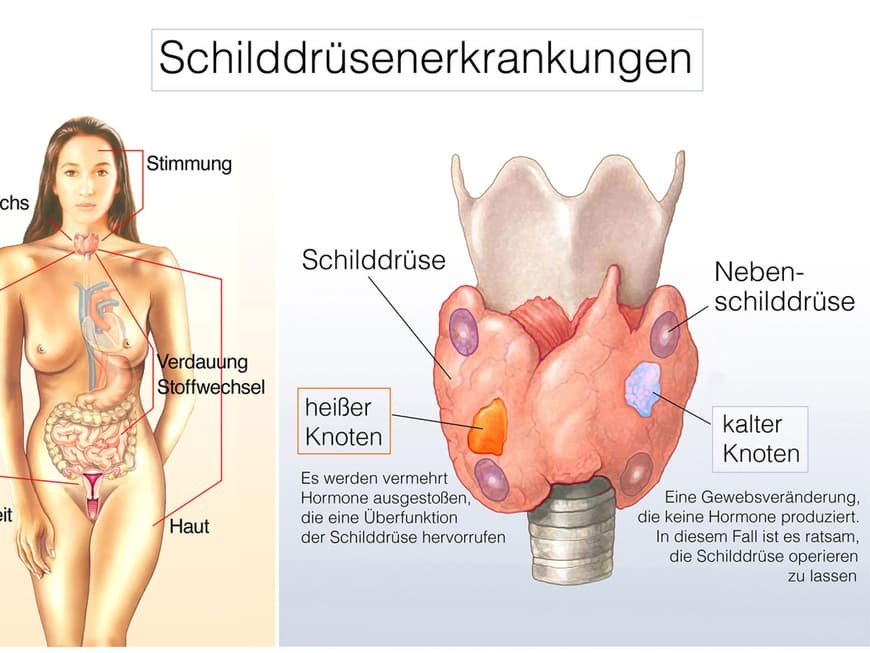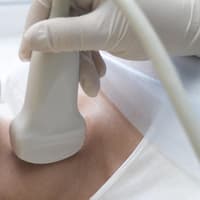What exactly does the thyroid gland do?
"The organ produces hormones. It is responsible for the body's heat and energy balance. It ensures a healthy heart, strong bones and a functioning digestive system. It is also important for our brain - without thyroid hormones, intelligence suffers. Basically, the thyroid gland ensures that the body functions - every single one of our cells is dependent on its hormones."
What values of the organ are normal and healthy?
"The TSH value is measured - this is a hormone that is produced in the pituitary gland and controls the hormone production of the thyroid gland. A value between 0.3 and 4.2 is normal. If it is higher, the patient has hyperthyroidism; if it is lower, they are suffering from hypothyroidism. Higher TSH values apply to older people."
Are these problems inherited?
"We assume so. However, there is no clear inheritance sequence from parents to their children, but you often find people with thyroid disorders in the family of someone affected."
How do I recognize a disease?
"There are many symptoms of hyperthyroidism or hypothyroidism, but these could also be attributed to other diseases. There is the so-called swallowing test, for which you only need a glass of water and a hand mirror. Put your head back, take a sip of water and look at your throat in the mirror while swallowing. If there is swelling below the larynx, you should see a doctor."
Is there anything I can do to protect the organ?
"Iodine deficiency is one of the main causes of thyroid problems. A not insignificant proportion of Germans still have an iodine deficiency. Many households already season their food with iodized salt, which is a very good thing - but the little bit of salt on potatoes or pasta is not really enough to cover our iodine requirements. Bread actually contains a lot of the trace element, as many bakers salt their dough with iodized salt."
Should you take iodine tablets as a precaution?
"I don't recommend taking iodine supplements on your own - it's better to consult a doctor. Incidentally, it is a misconception that the sea air on the coast contains iodine and that northern Germans therefore have no deficiency. A person from Hamburg is just as affected as a person from Munich. And: From the age of 40, you should have your thyroid checked regularly every one to two years to rule out a disease."
How are diseases treated?
"As a rule, the thyroid gland can be treated well today with medication and hormones. It depends on the type of disease. Unfortunately, surgery is often unnecessary - 30 to 35 percent of 60-year-olds have nodules in the thyroid gland, which can just as easily be left there."
Problem case Hashimoto's
Hashimoto's thyroid disease, named after the Japanese doctor Hakaru Hashimoto, is an autoimmune disease in which the thyroid gland is chronically inflamed. Sometimes hyperthyroidism can precede hypothyroidism. In most cases, however, Hashimoto's begins directly with hypothyroidism. Three percent of Germans suffer from it. The cause lies in the body's defenses: the immune system mistakenly attacks the tissue of the thyroid gland and destroys it. This results in chronic inflammation.
There are two types: the atrophic and the hypertrophic form. In the atrophic form, the cells of the thyroid gland disappear and the organ eats itself up, so to speak. In Germany, the majority of Hashimoto's patients suffer from this variant. In the rarer hypertrophic form, the organ enlarges, resulting in a goitre. The disease cannot be cured; hormones are usually administered to immobilize the thyroid gland and thus alleviate the symptoms. Only in extreme cases is the organ surgically removed as a last resort.
Our book tip: "Gut leben mit Hashimoto" by Dr. Joachim Feldkamp. Trias, 17.99 euros.
Triggers and therapies
Hypothyroidism:
- Hypothyroidism is the name given to the disease by doctors. The thyroid gland produces too few hormones. As a result, patients are tired, fatigued, have difficulty concentrating, suffer from excess weight without cause, constipation and hair loss.
- Hashimoto's disease is the most common cause of hypothyroidism. Severe iodine deficiency can also lead to it - the symptom of this is goitre, a lump below the larynx. The usual treatment consists of medication and thyroid hormones.
- So-called hot nodules can develop in the thyroid gland itself due to iodine deficiency. These nodules produce hormones in an uncontrolled manner - they are either treated with medication or surgically removed.
Hyperthyroidism:
- Hyperthyroidism is the technical term for this disease. And as the name suggests, too many thyroid hormones are produced. The symptoms are exactly the opposite of those of hypothyroidism: Weight loss without cause, palpitations, nervousness, jitteriness, sleep disorders and diarrhea.
- 95 percent of the diseases are caused by the autoimmune disease Graves' disease. The body produces antibodies against the thyroid gland; the cause is unclear. Symptoms: Protruding, light-sensitive eyes. Hot nodules are also caused by hyperthyroidism.
- It is also treated with medication or radioactive iodine. This is intended to immobilize the overactive thyroid gland. In some cases - but only very rarely - it is removed.
You may also be interested in this:
Thyroid gland: function, tasks and disease of the organ
Removing thyroid nodules without surgery
Hashimoto's: when the body attacks the thyroid gland
The thyroid gland: the completely underestimated organ








